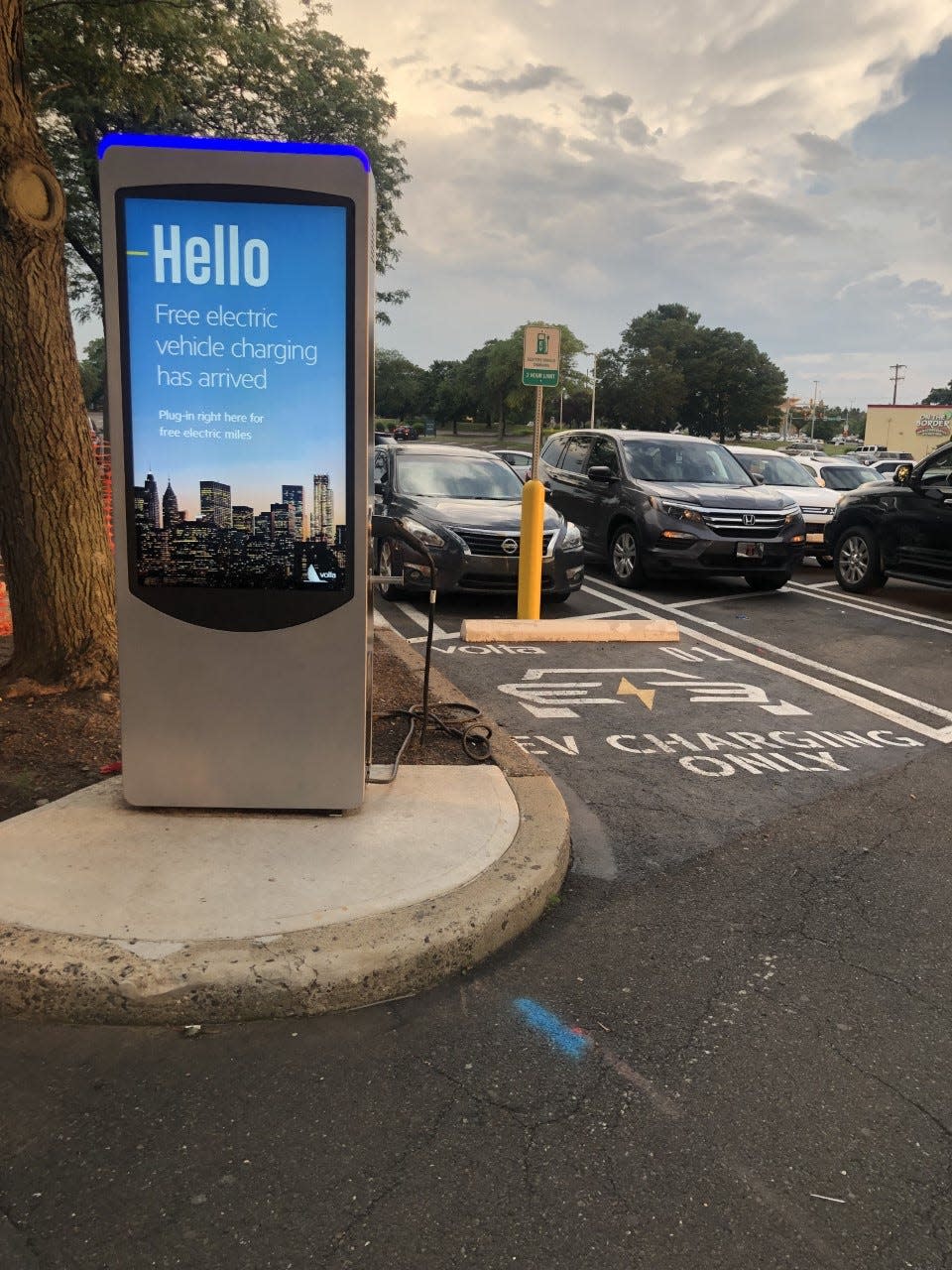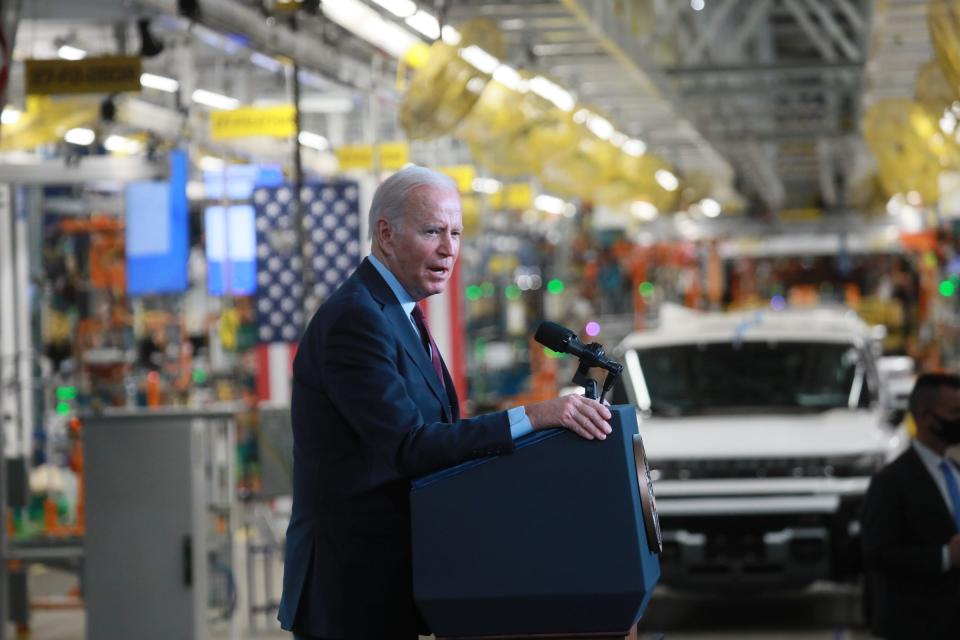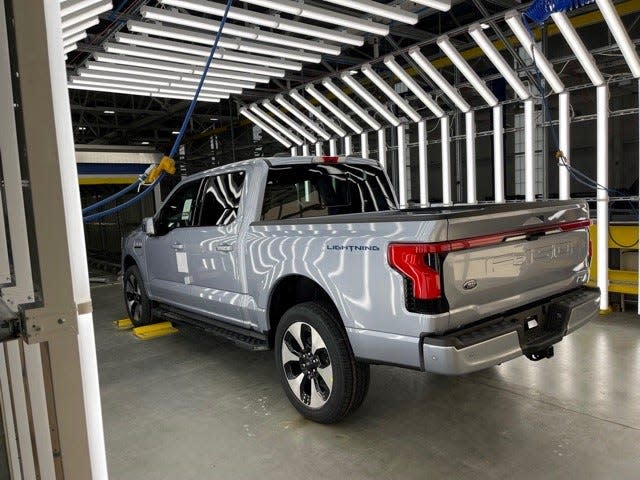More electric vehicle charging stations are coming to Bucks. Will people make the switch?
Bucks County is going electric.
Bucks' commissioners recently approved installing electric-vehicle charging stations at Peace Valley Park in Central Bucks. Some municipalities, such as Middletown, Wrightstown and Quakertown, also are getting on the electric vehicle charging bandwagon, with charging stations already available or in the works.
With $7.5 billion included in the federal infrastructure law to support public charging stations, continued concern over climate change and high gas prices that show little sign of slowing, the electric vehicle market is on the verge of being supercharged.
"There is no doubt we are in the electrified-vehicle decade, and our experts forecast even further growth of electrified vehicles in the years ahead," said Kelly Blue Book Editor Matt Degan. "The automotive marketplace continues to evolve and diversify more with each passing year. Hybrids are now mainstream products, and more than a dozen new EVs are slated to launch in 2022."
According to Kelly Blue Book, nearly 500,000 buyers bought electric vehicles, or EVs, in 2021. Shopping for electrified vehicles also hit a new record that year, with 28% of all shoppers considering one.
In all, nearly 1.5 million electrified vehicles — the combined total of EVs, hybrids and plug-in hybrids — were sold in the United States last year, accounting for 9.7% of all sales. According to the U.S. Department of Energy, sales of new, light-duty plug-in electric vehicles nearly doubled in just one year, from 308,000 in 2020 to 608,000 in 2021.
Yet there are roadblocks, including availability, purchase price and the lack of public infrastructure to power electric vehicles. There's almost always a gas station when you need one, but recharging an electric vehicle isn't as simple as rolling up to the nearest wall outlet.
"When looking at EV adoption, there are four barriers: charging access, model availability, upfront purchase price and public education," said Drive Electric Pennsylvania Coalition spokesperson Colton Brown. "We're working on the charging access and public education side, and focusing on incentive programs and funding Level 2 charging access throughout the state."

What you need to know about electric vehicle charging
There are more than 100 publicly available EV charging stations throughout Bucks and eastern Montgomery counties, according to the Department of Energy's Alternative Fuels Data Center website. These locations include car dealerships, shopping centers and hotels.
Parx Casino has charging stations in Bensalem. Wawa in Doylestown Borough has a "Tesla Supercharger" dedicated to drivers of that EV brand. You can charge your vehicle in Doylestown Township while your children play at the Kids Castle playground.
In contrast, there are nearly 300 gas stations in Bucks County alone, according to the U.S. Census.
There are three levels of EV charging: Level 1, Level 2 and Direct-Current Fast Charging.
According to the Pennsylvania Electric Vehicle Roadmap, all electric vehicles can plug in to a regular wall outlet with a Level 1 charger, which typically provides up to five miles of driving range per hour of charging.
Most electric vehicle charging occurs at home, at work, at businesses, and at public parking locations using Level 2 charging equipment. Electric vehicles typically receive 10 to 25 miles of driving range per hour from this hookup.
EV Charging at WaWa?Newtown Township planners to consider Wawa on Newtown Bypass
For subscribers:Gotta have a Wawa? Residents in these Bucks County towns are saying no thanks
Direct-current is the fastest form of charging. Equipment is typically installed near highway interchanges, in areas with high rates of electric vehicle ownership, and at businesses with heavy-duty electric vehicles.
A light-duty battery electric vehicle will get 100 to 250 miles of driving range in 30 minutes from DC fast charging.
Public stations often charge drivers to fill up, but the cost is cheaper than gasoline: According to the Department of Energy, a non-hybrid EV costs 2-5 cents per mile, while a gas-powered car will cost up to 36 cents per mile.
Those opting to charge at home could have the added expense of purchasing charging equipment and paying for installation and service. All told, a potential EV owner will have to spend nearly $1,400 for the convenience of home charging.
Advocates, however, say the added cost is worth it.
"The life cycle of these vehicles (is often longer than gas-powered vehicles) and helps get rid of local air problems in big cities," Brown said. "And there are a lot less operational costs. If you charge at home, you will pay normal electric rates, which right now, is going to cost you about $1.25 per hour. There is also 30-50% less maintenance, with less moving parts there is no need for oil changes.
"For now, you will spend more on an EV up front, but over the life of the vehicle you will save more."

Obstacles in the road toward greater adoption
As trendy as electric vehicles have become, there are very real obstacles preventing wider EV adoption, beyond the lack of charging infrastructure.
On the government side, switching to an all-EV fleet is nearly impossible at the moment.
"The challenge is our bigger vehicles. Our heavy trucks and some of our sheriff vehicles are bigger, so there aren’t many options out there for use to purchase electric vehicles or even hybrids,” said Bucks County Commissioner Chair Bob Harvie. “But we are committed to looking at our purchasing policies to see what can be done.”
Still, Bucks and some municipalities are are swapping out traditional, internal combustion engines for hybrid and all-electric vehicles when they can.
“We purchased the first two electric vehicles last year, which are used by the Department of Corrections to patrol around the prison in Bucks County,” said Harvie. “We’ve found that electric vehicles can be more expensive up front and as a government, we try to go with the lowest bidder, but we also save on fuel, and (electric vehicles) are also good for the environment.
“These vehicles should also last longer and have fewer maintenance issues because there are fewer moving parts and we should have less mechanical failures as time goes by.”
Middletown Township recently received a $215,000 grant from the Department of Environmental Protection for the installation of four DC fast charging stations at municipal building. The grant was part of $2.1 million in state Alternative Fuels Incentive Grants to municipalities and businesses for 99 electric vehicles and more clean fuel transportation projects across the state.
Middletown Board of Supervisors Chairperson Mike Ksiazek said this grant will further the township's efforts to embrace EVs and clean energy.
"We are very excited about this in Middletown. Last year we enacted a township climate action plan with the longterm goal of increasing environmental sustainability and reducing greenhouse gasses here and this (grant) will be a really big push," Ksiazek said. "We already have two charging station in the township and last year, we approved two more.
"We are also moving to replace our police cars with electric vehicles."
Bucks County hopes to extend its public charging infrastructure beyond Peace Valley, where there was easy access to a county-owned power generator.
“The goal is to have charging stations at every park the county owns,” Harvie said. “It isn’t a matter of getting the funding. At some parks, the most expensive part isn’t in the installation of the charging stations themselves, but in running electricity to it.
“In some of our other parks, (not having) electric power is a big difference.”
Harvie also said funds from the bipartisan infrastructure law will go toward building charging stations on major interstates that intersect Bucks County, but those future projects will be carried out in conjunction with the Pennsylvania Department of Transportation.

How much will an electric vehicle cost?
According to Cars.com, the least expensive EV currently on the market is the 2022 Nissan Leaf S 40kWh, which sells for $28,425 and gets 150 miles out of a single full charge. The most expensive is the 2022 Tesla Model X Plaid, which sells for $145,690 and can go 333 miles on a full charge.
The average price for an EV in December, according to Kelly Blue Book, was $56,437, while the average price of a combustion-engine vehicle was $47,077.
"While consumer survey data continues to indicate that EVs are too expensive and concerns remain about range and charging availability, consideration for the segment has never been higher," KBB's Degan said. "As EV availability expands and capability improves, even more new-car buyers likely will make the choice to buy electrified in 2022."
Prices also are falling. In 2011, the Nissan Leaf had a range of 73 miles and a price of $33,600, according to the EV Roadmap.
Those costs, advocates say, also can be mitigated via any available federal and state grants that benefit both businesses and consumers.
Those include the Alternative Fuel Vehicle Rebate Program, which offers rebates to assist eligible residents with the incremental cost of the purchase or lease of new or pre-owned alternative fuel vehicles.
For fleet management, the Pennsylvania Department of Environmental Protection offers rebates for the replacement or repower of Class 4-8 local freight trucks, school buses, transit buses and shuttle buses with new diesel, electric, or alternative fuel vehicles or technologies. Vehicles or engines being replaced or repowered must be scrapped in accordance with program guidelines.
"We have seen an increase in the interest in the grant programs," said Brown, of the Drive Electric Pennsylvania Coalition. "For Level 2 (charging platform), you just send in the application and any organization or business can apply for it. We've seen a pretty strong application rate over the past four months. And our DC fast-charging grant is offered in different rounds, and with every round, demand steps up."
Locally, energy provider PECO announced its Level 2 Commercial EV Charging Pilot rebate program, which provides incentives to commercial and industrial customers to offset the cost of installing EV charging infrastructure at workplaces, retail businesses, public charging areas, and multi-unit dwellings.
Projects located within PECO's service territory are eligible to receive up to $2,000 per charging port or 50 percent of eligible make-ready costs, up to a maximum of 20 ports. The rebate can reach $3,000 if other stipulations are met.
"Supporting clean electric transportation is critical to reducing our carbon footprint and bringing cleaner air to our communities, and it is an important part of our company's Path to Clean," said Liz Murphy, PECO Senior Vice President of Governmental, Regulatory and External Affairs. "We are proud to offer this new rebate program to support the equitable buildout of EV charging infrastructure across southeastern Pennsylvania."
This article originally appeared on Bucks County Courier Times: Electric vehicles gaining popularity. What Bucks County residents need to know

